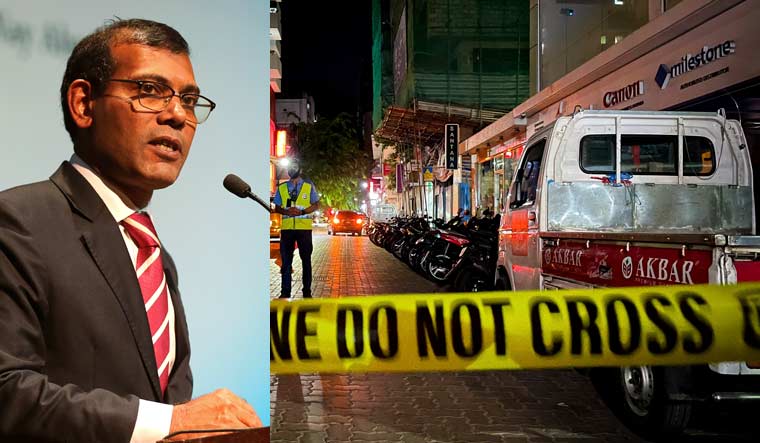A top official in the Maldives said Saturday that Islamic extremists were responsible for an explosion that critically wounded former President Mohamed Nasheed earlier this week, as police said they arrested two of four suspects.
Hospital officials said Saturday that Nasheed, 53, was conscious and no longer needed breathing support, but remains in an intensive care unit after initial life-saving surgeries to his head, chest, abdomen and limbs.
They told reporters that shrapnel from the blast damaged his intestines and liver and that a piece of shrapnel broke his rib and had been a centimetre (0.4 inches) from his heart.
Prosecutor General Hussain Shameem told reporters that investigators still don't know which extremist group was behind Thursday's attack, which also wounded two of Nasheed's bodyguards and two apparent bystanders, including a British citizen.
Police announced Saturday that two men were arrested in connection with the attack, and released a photo of a person they said is the main fugitive suspect, seeking public assistance in identifying him. No group has claimed responsibility.
Nasheed, the current Parliament speaker, has been an outspoken critic of religious extremism in the predominantly Sunni Muslim nation, where preaching and practicing other faiths are banned by law.
He's also been criticised by religious hard-liners for his closeness to the west and liberal policies.
Officers from the Australian Federal Police arrived Saturday in the Maldives to assist with the investigation, following a request from the country's government. A British investigator is expected to arrive in the Indian Ocean archipelago on Sunday.
Police presented reporters with security camera footage of the blast, in which Nasheed and his bodyguards are seen walking through a narrow passage that leads from his home to a main road.
An explosion occurs as Nasheed approaches his car. Authorities say a homemade explosive device containing ball bearings was attached to a motorbike parked near his car, possibly detonated by remote control.
Nasheed was the first democratically elected president of the Maldives, serving from 2008 to 2012 when he resigned amid protests. He was defeated in the following presidential election, and was ineligible for the 2018 election due to a prison sentence, but has remained an influential political figure.
He has championed global efforts to fight climate change, particularly warning that rising seas caused by global warming threaten the archipelago nation's low-lying islands.
The Maldives is known for its luxury resorts but has experienced occasional violent attacks. In 2007, a blast in a park in the capital wounded 12 foreign tourists and was also blamed on religious extremists.
The Maldives has one of the highest per-capita numbers of militants who fought in Syria and Iraq alongside the Islamic State group.
Authorities announced in January that eight people arrested in November were found to have been planning to attack a school and were in the process of building bombs in a boat at sea.
Police said the suspects conducted military training on uninhabited islands and recruited children.





